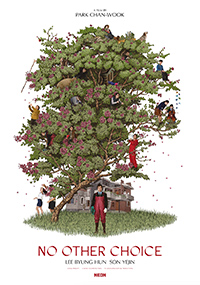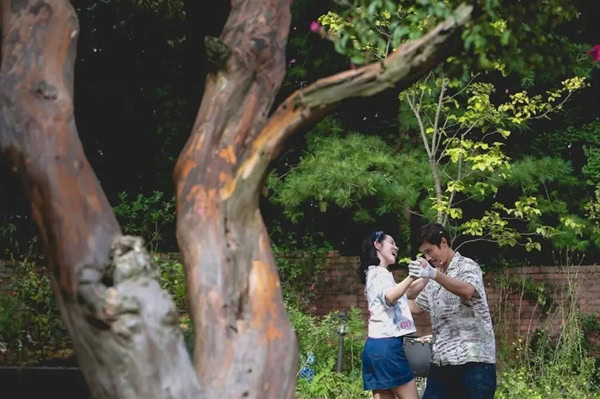Slay the Competition: Chan-wook Explores the Horrors of Capitalism
 In many ways, Donald Westlake’s 1997 novel The Ax feels more relevant than ever, which is why Park Chan-wook’s adaptation No Other Choice feels so strangely felicitous taking place, as it does, nearly three decades later halfway across the world. Costa-Gavras (to whom this film is dedicated) previously adapted the text in 2005, set in Belgium but also sticking close to the spirit of Westlake (aka Richard Stark), an American genre writer who wrote so prolifically about behavioral underbellies, including as a screenwriter in fare like The Stepfather (1987) and a phenomenal adaptation of Jim Thompson’s The Grifters (1990). Chan-wook also hews close to the source material, contemporizing the realities of a paper industry executive who is laid off following a corporate takeover who’s eventually inspired to murder his potential competition in a dwindling job market to maintain the lifestyle he’s become accustomed to.
In many ways, Donald Westlake’s 1997 novel The Ax feels more relevant than ever, which is why Park Chan-wook’s adaptation No Other Choice feels so strangely felicitous taking place, as it does, nearly three decades later halfway across the world. Costa-Gavras (to whom this film is dedicated) previously adapted the text in 2005, set in Belgium but also sticking close to the spirit of Westlake (aka Richard Stark), an American genre writer who wrote so prolifically about behavioral underbellies, including as a screenwriter in fare like The Stepfather (1987) and a phenomenal adaptation of Jim Thompson’s The Grifters (1990). Chan-wook also hews close to the source material, contemporizing the realities of a paper industry executive who is laid off following a corporate takeover who’s eventually inspired to murder his potential competition in a dwindling job market to maintain the lifestyle he’s become accustomed to.
After serving twenty-five years at Solar Paper, You Man-su (Lee Byung-hun) is laid off when his company is bought out by an American corporation. His supportive wife Miri (Son Ye-jin) steps away from being a housewife to take work as a dental hygienist, though her handsome boss is cause for alarm, it seems. Having made a significant salary as a manager, their life of luxury is soon compromised when Man-su cannot find work after his severance pay expires. Their tightened belts can only salvage so much. When they can no longer pay the mortgage and it would seem they’ll have to move, this is a breaking point for Man-su, who had remodeled his childhood home into the envious estate it is currently. Their children are also affected by this turn of events, with Miri’s son from a previous relationship stealing high-end electronic equipment and their daughter, a cellist prodigy, suddenly finding the development of her skills compromised by their inability to pay an experienced enough teacher. An offhand joke about lightning striking down a man occupying a position Man-su would be qualified for inspires the development of a desperate undertaking. If he murders the man who has the position he wants, he will first have to eliminate his better skilled competitors. Faking an advertisement for a new paper company planning to enter the Korean market, Man-su collects resumes from local colleagues who might best him in an interview. And then sets out to kill them.

Like all of Chan-wook’s films, No Other Choice is a delicious, exquisite visual feast. Lensed by DP Kim Woo-hyung, the film metaphorically begins in autumn, just as Man-su is destined to take a fall. Our introduction to the family is so picture perfect, it reads saccharine sweet until details begin to emerge about a home life that wasn’t without its own struggles. The tenuous fantasy is swept away when Mun-su is laid off, months flying by without a viable prospect to return to a position he’s qualified for. The title ends up being a euphemism for the moral dilemma multiple characters face, from the American company downsizing the staff, to murder and complicity, the phrase ‘no other choice’ is clearly a lie uttered by everyone to excuse making the wrong choice. ‘No other choice’ is code for ‘unwilling to make necessary sacrifices to do the right thing.’
Lee Byung-hun, often so adept at playing sinister roles, is comically effective as a conflicted family man who has a history of compulsion issues. His family has become accustomed to the hyper consumption his salary guaranteed and their collective self-entitlement slowly begins to materialize. Unlike the previous iterations of this scenario, Chan-wook enhances the wife’s involvement, as Son Ye-jin eventually becomes integral to keeping the family afloat beyond taking up employment. As such, No Other Choice bears striking parallels to the familial entity at the heart of Bong Joon-ho’s economic horror film Parasite (2019) but from an opposing perspective. Min-su’s family must reassert their position in the cultural hierarchy or else risk being tainted by the stain of working class woes.
While Chan-wook reduces the number of murders the original protagonist must commit, he whittles them down to three choice instances, one of them being the piece de resistance of the film when Mun-su must contend with his first victim’s wife, who plays a surprising role in his master plan (something he constantly almost bungles due to his ineptitude at murder). Much like 2022’s Decision to Leave (read review), Chan-wook takes his time in unwinding his devious tale, a masterful neo-noir about following dangerous fantasies to their logical conclusion in job markets further compromised by a dependence on AI. Fittingly, a corpse is disposed of beneath the roots of a recently planted apple tree, which will bear fruit ripened by a shared sinful knowledge, exploiting the nutrients of its deviously enriched soil and delivering ingredients to its owners for their own just desserts.
Reviewed on August 29th at the 2025 Venice Film Festival (82nd edition) – In Competition. 139 Mins.
★★★★/☆☆☆☆☆


